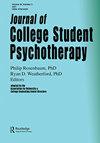Mental Health, Life Satisfaction, Supportive Parent Communication, and Help-seeking Sources in the wake of COVID-19: First-generation College Students (FGCS) Vs. Non-first-generation College Students (non-FGCS)
IF 1.1
Q3 PSYCHOLOGY, APPLIED
引用次数: 19
Abstract
ABSTRACT Using a cross-sectional survey (N = 1,225), this study examines the psychological well-being (stress, anxiety, depression), life satisfaction, supportive parent communication, and likelihood to seek mental and emotional support from different sources between FGCSs and non-FGCSs during the early period of the COVID-19 pandemic. Results show that while FGCSs and non-FGCSs report similar levels of stress and depression, FGCSs have higher anxiety and lower life satisfaction and supportive parent communication than non-FGCSs. Although supportive parent communication is negatively associated with stress, anxiety, and depression and positively associated with life satisfaction in both groups, these associations are stronger for FGCSs than non-FGCSs. Further, FGCSs are less likely to seek mental and emotional help from family and friends than non-FGCSs, while these help-seeking behaviors may mitigate their mental distress and enhance their life satisfaction. We address college mental disparity and highlight the lack of interpersonal support for FGCSs’ mental wellness during this health crisis.2019冠状病毒病后的心理健康、生活满意度、支持性父母沟通和求助来源:第一代大学生(FGCS)与非第一代大学生(非FGCS)
本研究采用横断面调查(N = 1225),研究了在COVID-19大流行早期,fgcs和非fgcs之间的心理健康(压力、焦虑、抑郁)、生活满意度、支持性父母沟通以及从不同来源寻求精神和情感支持的可能性。结果显示,虽然fgcs和非fgcs报告的压力和抑郁水平相似,但fgcs比非fgcs有更高的焦虑和更低的生活满意度和支持父母的沟通。尽管在两组中,支持性父母沟通与压力、焦虑和抑郁呈负相关,与生活满意度呈正相关,但这些关联在fgcs中比在非fgcs中更强。此外,fgcs比非fgcs更不可能从家人和朋友那里寻求精神和情感帮助,而这些寻求帮助的行为可能会减轻他们的精神痛苦,提高他们的生活满意度。我们解决了大学心理差异问题,并强调在这场健康危机中,fgcs的心理健康缺乏人际支持。
本文章由计算机程序翻译,如有差异,请以英文原文为准。
求助全文
约1分钟内获得全文
求助全文
来源期刊

JOURNAL OF COLLEGE STUDENT PSYCHOTHERAPY
PSYCHOLOGY, APPLIED-
CiteScore
3.20
自引率
7.10%
发文量
16
期刊介绍:
The Journal of College Student Psychotherapy® is dedicated to enhancing the lives of college and university students by featuring high-quality articles about practice, theory, and research in mental health and personal development. Contributions to the journal come from professionals in the field of mental health and counseling and from college staff, faculty, and students. The journal is written specifically for college and university administrative staff and faculty as well as counselors and mental health professionals. Regular quarterly issues of the journal feature articles of central interest to psychotherapists and counselors while also expressing broader implications for everyone who wishes to understand students.
 求助内容:
求助内容: 应助结果提醒方式:
应助结果提醒方式:


